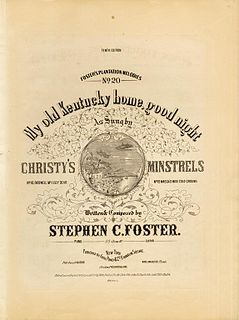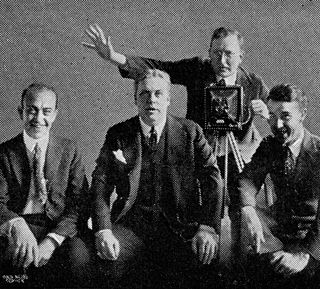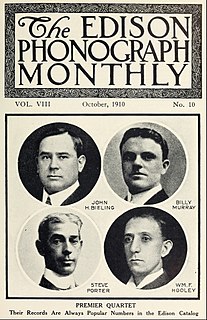Related Research Articles
Spirituals is a genre of music that is "purely and solely the creation" of generations of African Americans, which merged African cultural heritage with the experiences of being held in bondage in slavery, at first during the transatlantic slave trade—the largest and most inhumane forced migration in recorded human history, and for centuries afterwards, through the domestic slave trade. Spirituals encompass the "sing songs", work songs, and plantation songs that evolved into the blues, and the gospel songs in church. In the nineteenth century, the word "spirituals" referred to all these subcategories of folk songs. While they were often rooted in biblical stories, they also described the extreme hardships endured by African Americans who were enslaved from the 17th century until the 1860s. From its roots in African music, new derivative music genres emerged from the spirituals songcraft.
The Haydn Quartet, later known as the Hayden Quartet, was one of the most popular recording close harmony quartets in the early twentieth century. It was originally formed in 1896 as the Edison Quartet to record for Edison Records; it took its new name when recording for other companies. The name was a homage to Joseph Haydn, the classical composer; the spelling was later revised to Hayden, which reflects the way it was pronounced. The group disbanded in 1914.

Little Wonder Records was a United States children's record label from 1914 through 1923. The label was known for producing one-sided records with abbreviated versions of songs at a very low price.

"Swing Low, Sweet Chariot" is an African-American spiritual song and one of the best-known spirituals in Christian history. Originating in early oral and musical African-American traditions, the date it was composed is unknown. Performances by the Hampton Singers and the Fisk Jubilee Singers brought the song to the attention of wider audiences in the late 19th century. J. B. T. Marsh includes an early version of text and tune in his 1876 publication The Story of the Jubilee Singers, with their Songs. The earliest known recording of "Swing Low, Sweet Chariot" was taken in 1909, by the Fisk Jubilee Singers of Fisk University.

The Golden Gate Quartet is an American vocal group. It was formed in 1934 and, with changes in membership, remains active.

"My Old Kentucky Home, Good-Night!" is a sentimental minstrel song written by Stephen Foster, probably composed in 1852. It was published in January 1853 by Firth, Pond, & Co. of New York. Foster was likely inspired by Harriet Beecher Stowe's Uncle Tom's Cabin, as evidenced by the title of a sketch in Foster’s sketchbook, “Poor Uncle Tom, Good-Night!” Some have claimed that Foster was inspired by visits to the Bardstown, Kentucky plantation called Federal Hill in the 1850s. However, no direct or contemporary evidence of this visit has surfaced, and this claim has been contested by most prominent Foster scholars, including William Austin, Ken Emerson, and John Tasker Howard.

Polk Miller was a pharmacist and musician from Richmond and Bon Air, Virginia.

Arthur Francis Collins was an American baritone who was one of the most prolific and beloved of pioneer recording artists, regarded in his day as "King of the Ragtime Singers".

The Peerless Quartet was an American vocal group that recorded in the early years of the twentieth century. They formed to record for Columbia Records, where they were credited as the Columbia Quartet or Columbia Male Quartet. From about 1907, when they began to record for record labels other than Columbia, they were more widely known as the Peerless Quartet.

The Fisk Jubilee Singers are an African-American a cappella ensemble, consisting of students at Fisk University. The first group was organized in 1871 to tour and raise funds for college. Their early repertoire consisted mostly of traditional spirituals, but included some songs by Stephen Foster. The original group toured along the Underground Railroad path in the United States, as well as performing in England and Europe. Later 19th-century groups also toured in Europe.

"Wade in the Water" is an African American jubilee song, a spiritual—in reference to a genre of music "created and first sung by African Americans in slavery". The lyrics to "Wade in the Water" were first co-published in 1901 in New Jubilee Songs as Sung by the Fisk Jubilee Singers by Frederick J. Work and his brother, John Wesley Work Jr., an educator at the historically black college in Nashville, Tennessee, Fisk University. Work Jr. —who is also known as John Work II—spent thirty years collecting, promoting, and reviving the songcraft of the original Fisk Jubilee Singers, which included being a member and director of the Fisk Jubilee Quartet. The Sunset Four Jubilee Singers made the first commercial recording of "Wade in the Water" in 1925—released by Paramount Records. W. E. B. Du Bois, who called this genre of songs, the Sorrow Songs, reviewed the Sunset Four Jubilee Singers' performance of "Wade in the Water" in a 1925 article in The Crisis —the National Association for the Advancement of Colored People's official magazine. "Wade in the Waters" is associated with songs of the Underground Railroad.

The American Quartet was a four-member vocal group that recorded for various companies in the United States between 1899 and 1925. The membership varied over the years, but the most famous line-up — comprising John Bieling, Billy Murray, Steve Porter (baritone), and William F. Hooley (bass) — recorded for the Victor Talking Machine Company from 1909 to 1913. The same group of singers also recorded for Edison Records as the Premier Quartet, and for that and other labels as the Premier American Quartet. From 1912 to 1914 the quartet also recorded with countertenor Will Oakland as the Heidelberg Quintet.
The Unique Quartette was a black vocal quartet in New York City. Founded in the mid-1880s by Joseph Moore, they are best known for a handful of wax cylinder recordings made in the first half of the 1890s. They are the earliest known black vocal group to have been commercially recorded, with their first recordings made in December 1890 for the New York Phonograph Company.

Stephen Carl Porter was an American pioneer recording artist, who recorded prolifically for numerous recording companies in the 1890s and early 1900s. He was also an entrepreneur who helped establish the recording industry in India in the early years of the twentieth century, and successfully marketed a new form of hearing aid.

Albert Charles Campbell was an American popular music singer who recorded between the late 1890s and the 1920s. He was best known for his many duo recordings with Henry Burr, and as a member of the Peerless Quartet and other vocal groups, but also recorded successfully as a solo singer both under his own name and under various pseudonyms including Frank Howard.

John H. Bieling was an American tenor singer who was a pioneer recording artist in the early years of the twentieth century. He featured on thousands of recordings, especially as a member of The Haydn Quartet and The American Quartet, two of the most popular vocal groups of the period.

Samuel Holland Rous, who recorded using the name S. H. Dudley, and less frequently as Frank Kernell, was an American singer, pioneer recording artist, and music business executive. He was unrelated to the black vaudeville performer and impresario Sherman Houston Dudley.

Oscar Seagle was a prominent musician and music teacher active in the early 20th century. He founded the Seagle Music Colony in Schroon Lake, New York.

Harry Anthony (1870–1954) was an American tenor and pioneer recording artist. With James F. Harrison he made several recordings of religious music that were popular at the time. He was known as a solo artist, and also became a member of the American Quartet. He made records for most of the major recording companies of the day.

Charles Adam Asbury was an American banjo player and pioneer recording artist active from 1876 to 1897. On the stage, he played parts that emphasized his multiracial ancestry, and his recording work was largely in the minstrel tradition. His surviving recordings are the earliest examples of the stroke style of banjo.
References
- ↑ Brooks, Tim; Spottswood, Richard Keith (2005). Lost Sounds: Blacks and the Birth of the Recording Industry 1891-1922. University of Illinois Press. pp. 155–159. ISBN 978-0-252-07307-6.
- ↑ Brooks and Spottswood, pp. 155-56
- ↑ Brooks and Spottswood, p. 157
- ↑ Brooks and Spottswood, p. 158
- ↑ "First Black Vocal Group to Make A Record". Archived from the original on 2009-02-27.
- ↑ Brooks, Tim. "Earliest Negro Vocal Quartets". Archived from the original on 2011-07-24.
- ↑ Brooks and Spottswood, p. 159